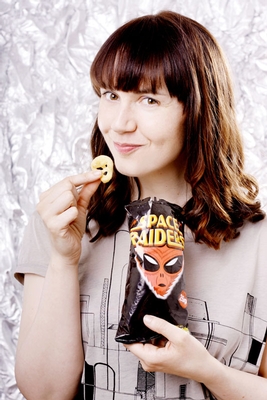 I met up with Helen Keen in an affectedly atmospheric “tavern” in Notting Hill. We were there to talk about her forthcoming series for BBC Radio 4, It Is Rocket Science!, which is billed as “a low budget, highly subjective look at the history and future of space travel”. This wonderful show introduces us to the idiosyncrasies of the founders of modern rocket science; to the oddities of our quest to put humans on the moon; and to the uncomfortable history upon which the development of rocket technology has depended. It is an original, endearingly ramshackle, delightful piece of work. It is also strangely, uniquely, moving.
I met up with Helen Keen in an affectedly atmospheric “tavern” in Notting Hill. We were there to talk about her forthcoming series for BBC Radio 4, It Is Rocket Science!, which is billed as “a low budget, highly subjective look at the history and future of space travel”. This wonderful show introduces us to the idiosyncrasies of the founders of modern rocket science; to the oddities of our quest to put humans on the moon; and to the uncomfortable history upon which the development of rocket technology has depended. It is an original, endearingly ramshackle, delightful piece of work. It is also strangely, uniquely, moving.
Originally written as a piece of stand-up for the Edinburgh Festival, where it debuted in 2008 to an audience of one, the show has since undergone a lengthy period of re-writing in order to bring it to radio. The precision and the pace of the finished script is tribute to the care with which Helen and her friend and co-writer, Miriam Underhill, have approached this task, and their writing is brought to life brilliantly by Helen and her co-stars, Peter Serafinowicz and Susy Kane. What one really notices, though, is the tremendous enthusiasm Helen has for her subject, and her sensitivity to what it means to want to gaze at and explore the universe.
This sensitivity developed at an early age. “I remember when Halley’s Comet came over in the 1980s”, she tells me when I ask about the origins of her love of space. “I remember hearing about it on Newsround and at school and thinking: that’s going to be amazing. And just being fascinated by the idea that there’s this comet, and it travels round and round, and you can see it twice in your life, once when you’re very young, then it’ll come round again when you’re old. It’s a sort of personal relationship with something in the universe.”
It was this appreciation of the universe that helped Helen cope with her many anxieties and anxiety-based problems, the most serious of which was the condition known as selective mutism. “I am a very anxious person. But when you actually look at the universe, none of it matters. And there’s such relief about that. I’ve never understood it when people say ‘the universe is so big and that makes us all so insignificant.’ I sort of think – I have a joke about this in the show – if the universe was the size of Hull, most of us would still be quite insignificant. And that’s just very reassuring.”
Having access to this kind of reassurance was obviously of great importance to Helen while she was growing up, but by the time she had finished university the condition was still affecting her ability to speak in public. It was at this stage that she decided that it was time to do something to overcome it: “That was why I ended up going to acting classes and then going into stand up – as a sort of kill or cure. And that was very helpful for shrugging off anxieties about talking in front of people.” After taking this brave decision Helen began to consider the possibility of writing about the science of space travel. “I was interested in space before, but that was the first time I found out about the fact that in the 1920s there was this mini craze for rockets in Germany. And I thought that was an amazing story.”
This was the story of a decade in which Breslau saw the founding of an amateur rocket club known as the Verein für Raumschiffart; in which the car manufacturer Opel started conducting research into rocket cars; and in which Fritz von Opel – “Rocket Fritz” – raced a rocket car, and later piloted what was possibly the first ever flight with a manned rocket-aircraft. Although the comic potential of this material did, in a rather inchoate way, present itself to Helen at the time, she started by “trying to write a very serious play. Which," she adds charmingly, "for the general good never really took off”.
One reason for taking a more serious approach was her increasing awareness of the fact that rocket science would come during the war to be allied to the technological ambitions of the Nazis, who in the same period were engaged in the “nuclear energy project” of the second Uranverein. “I always mention this, but I don’t have a glib answer for it. Rockets developed during the Second World War and, as with so many great advances, they developed because of slave labour. That’s one of the things that moves the technology forwards. And it’s a very uncomfortable fact, I think. It’s very dark. Which is perhaps why it didn’t instantly strike me that this was going to be a particularly hilarious idea.”
It Is Rocket Science! does not engage with these ideas in a concerted way, and it certainly doesn’t try to resolve the grim tension that exists in this story between progress and barbarism. But by raising in a comic way the more disturbing elements of the history of rocket science, Helen does hope that her audience will – having laughed at the often very funny anecdotes she tells – be encouraged to think about just what it is they’ve been laughing at. “It’s quite nice, I think – the idea that you do a comedy show and people will take something away from it, reflect on it.” What, I ask, is it that she wants them to reflect on? On the fact that technological advances are not always allied to rationalism, to humanism?
“Well I say in the show that you should Google Jack Parsons. He wasn’t a Nazi – he was a Satanist who was always doing these weird sex-magic routines with L. Ron Hubbard.” This was the Jack Parsons whose innovations were vital to the development of the invention of jet-assisted take-off – of the ability to leave the planet? “Yeah, and Hubbard the Scientologist. So I wanted to show people – because you get so many, and I get it when I’m doing my show, who say that we didn’t go to the moon, that they did it in a studio, or they did it in a quarry in Swindon – I wanted to show that when you actually know how extraordinary the story is, that there’s extraordinary stuff that’s true, you don’t need to pretend that it’s all a conspiracy.”
How extraordinary, then, are these stories? Well, in addition to producing research that was crucial to the development of rocket science, Parsons established himself as a noisy devotee of the British occultist Alasteir Crowley; came to be regarded as a saviour by a Californian rabble who shared his crackpot infatuation with Mr. Crowley; and got himself blown up by a disgruntled mug of coffee. He also has the distinction of having tried to conjure a “Moon Child”, a magic being designed to herald a new age of liberty and signal the end of the Christian era and its outmoded morality. One can half sympathise.
The delicacy and energy with which Helen presents such tales makes for an inspiriting alternative to the leaden sarcasm with which figures like Parsons can often be treated in science-based or sceptical comedy. This is one reason why we should pause before categorising It Is Rocket Science! as simply another contribution to these burgeoning movements. Although Helen does not object to being thought of alongside these “bright people with very questioning minds”, she doesn’t necessarily think of her show as sharing with such movements a common purpose. This is apparent not just from the content of It Is Rocket Science!, but also from its form and tone. For where some sceptical comedy can feel slightly smug It Is Rocket Science! adopts a more playful and sophisticated approach, and makes a virtue of its amateur feel.
This slightly rickety, low-budget quality is fundamental to Helen’s vision of the series. One reason for this is that she wants to distinguish her show from the slick, expensive television programmes on space that have proved so popular over the years; but she also hopes that, while casting an ironic yet appreciative glance at such programmes, It Is Rocket Science! will offer an alternative and fresh way of alerting people to the wonders of space travel. The decision works brilliantly, inviting the listener to feel that he is joining the cast on a voyage of discovery, and enabling him to share in Helen’s enthusiasm for a new age of exploration. “I would love”, she tells me, “to see a moonbase in my lifetime. I would love to see people going back into space. I would love to see a reawakening of this excitement that people had in the 1960s. So I guess I’m kind of banging the drum for that as well. And if in a small way a couple more people become interested in space . . .”
Listening to It Is Rocket Science!, one feels certain that its unique combination of charm, irreverence, intellect and vitality will ensure that it realises this modest ambition within moments of its opening episode. The moonbase might take a little longer. But in its small and understated way, this series does make us feel something of the profundity and the excitement that accompanied our first journeys beyond this planet. It does so with a wit, care and lightness of touch that is characteristic of Helen herself. It does so because a young girl once felt anxious and looked with wonder at the stars.
It Is Rocket Science! will be broadcast on Wednesday 9 March at 11pm on BBC Radio 4. The series runs for four weeks.
Helen Keen will be hosting a “Spacetackular” to celebrate the 50th anniversary of the first ever manned- space-flight, by Russian cosmonaut Yuri Gagarin. The event will take place at 8pm on 12 April. Venue: Upstairs at the Camden Head, Camden High Street, London.

